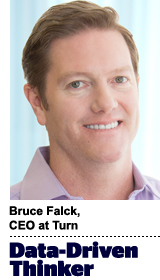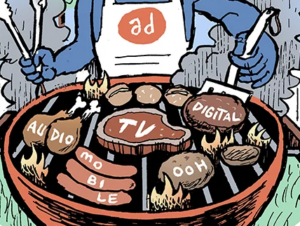 “Data-Driven Thinking” is written by members of the media community and contains fresh ideas on the digital revolution in media.
“Data-Driven Thinking” is written by members of the media community and contains fresh ideas on the digital revolution in media.
Today’s column is by Bruce Falck, CEO at Turn.
Much has been made recently of the issues and challenges marketers face when they put all their eggs in the Facebook or Google baskets.
As Lisa Donohue of Starcom pointed out, the scale those players offer matters, but innovation and specialized offerings can just as likely come from the rest of us in ad tech. I think there is a lot of opportunity for the “other guys,” as Donohue put it, to step up and fill in the white space on behalf of major brands and agency clients.
There’s a lot that Facebook and Google do very well, but they certainly have vulnerabilities that can be addressed by independent ad tech in the service of marketers.
The Publisher And Tech Conflict
The core of the problem stems from the combination of technology and media properties. I believe that marketers ultimately want to “buy Bruce” wherever he is – across all publishers, platforms and channels – inclusive of Facebook and Google. To do that, you need an agnostic buying platform that will allow access to Bruce at any and all of those points.
Historically, Google’s DoubleClick has shared this belief, allowing marketers to buy on other exchanges and run ads across the Internet. Facebook is a bit different since it is primarily a publisher, though the social network’s Atlas program allows advertisers to buy outside of the Facebook ecosystem. Both are starting to skate close to the edge, however, when it comes to separating technology and media. Right now, for instance, the only way to buy YouTube’s TrueView is via Google’s DoubleClick Bid Manager.
I think this is deeply problematic for marketers because publishers should not be dictating what technology gets used to buy what inventory. Marketers should be selecting technology based on capabilities and performance, not because that technology comes with a discount on media or is simply the only way to access the desired inventory. If the goal is to reach Bruce wherever he may be, using the best technology to do so, technology must be media agnostic.
If marketers are not accessing the best technology because they are beholden to a publisher with an agenda, they are undermining the promise of programmatic.
The Brand’s Data Matters
If Bruce has a credit card, debit card and mortgage with Wells Fargo and spends a lot of time on its app and website, then the brand knows quite a bit more about Bruce than Facebook does and it’s information that is most relevant to the company.
Facebook may be able to tell you really valuable things about Bruce, but Wells Fargo has a lot of valuable data about Bruce that has nothing to do with paid media. It wants to be able to use that to assess the opportunities and activate its data everywhere, including on Facebook and Google.
There is a lot of important engagement happening within the walled gardens, but the consumer journey goes beyond those walls. To get a unified single view of a customer, you need to consider how they behave everywhere.
This is especially true since many of the big brands today, including Red Bull, Kraft and AmEx, are publishers in their own right, produce tons of content and have the ability to gather data on their customers via many online and offline touchpoints. For such marketers, paid media is just one piece of the puzzle.
Independents Are More Focused
The reality is that advertisers have one primary agenda: to put the right messages in front of customers at the right time. Publishers have another: to make as much money from advertisers as possible. These two goals intersect at many points since happy advertisers tend to return to publishers to buy more advertising.
However, there is nothing stable or expected about the technology industry. Thanks to new sources of data, machine learning and improved algorithms, the tools advertisers have at their disposal get better all the time.
Often, ad tech innovation is happening in surprising corners, not from the media behemoths. It’s true that Google probably has the ability to build nearly anything, but it’s also true that they are busy trying to build everything. I worked at Google and I know that while DoubleClick Bid Manager is important, it is not the company’s only priority.
The developmental priorities for Facebook’s ad tech offerings are also unclear, as has been noted. Those in the independent ad tech space are focused on one thing: helping marketers win in digital. Google or Facebook might just come up with the next big innovation in online advertising, but they might not, so advertisers would be wise to keep their eyes – and their options – open.
Follow Bruce Falck (@brucefalck), Turn (@TurnPlatform) and AdExchanger (@adexchanger) on Twitter.













